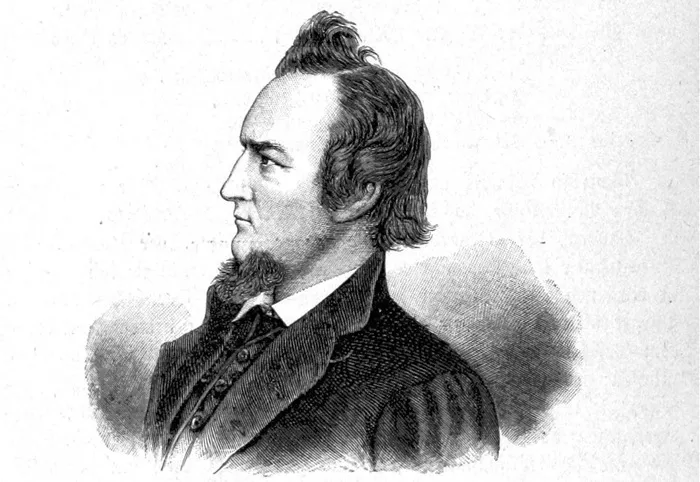Karl Heinzen, a notable figure in 19th-century German poetry, was born on February 22, 1809, in Grevenbroich, Germany. His life and work encapsulate the tumultuous socio-political landscape of his time, reflecting a blend of revolutionary zeal and literary expression. As a 19th-century German poet, Heinzen’s contributions extend beyond poetry into political activism and philosophical discourse, distinguishing him from many of his contemporaries.
Early Life and Influences
Heinzen’s formative years were marked by personal and political upheavals. The death of his mother when he was four years old and the subsequent influence of his stepmother, who urged him towards a clerical path, instilled in him a strong anti-clerical sentiment. His father’s opposition to Prussian dominance further fueled Heinzen’s disdain for authoritarian regimes. These early experiences profoundly shaped his ideological outlook and later permeated his literary works.
Literary Career and Themes
Heinzen’s literary oeuvre is characterized by a passionate engagement with themes of freedom, justice, and human rights. His poetry often served as a vehicle for his revolutionary ideas, intertwining personal emotion with political conviction. In his collection “Gedichte,” published in 1858, Heinzen explores concepts such as love, liberty, and societal critique, reflecting his commitment to both artistic expression and social commentary.
One of Heinzen’s notable works, “Ein Steckbrief,” delves into the political and social dynamics of 19th-century Prussia. This piece exemplifies his sharp critique of state control and his advocacy for individual freedom, themes that resonate throughout his poetry and prose.
Comparison with Contemporaries
When juxtaposed with other 19th-century German poets, Heinzen’s work stands out for its overt political engagement. While poets like Heinrich Heine also addressed social and political issues, Heinzen’s approach was more radical and unyielding. Heine’s poetry, for instance, often blended romanticism with satire, subtly critiquing societal norms. In contrast, Heinzen’s writings were direct and incendiary, mirroring his revolutionary activism. This distinction underscores the diversity within German poetry of that era, highlighting the spectrum of responses to the socio-political challenges of the time.
Political Activism and Its Impact on His Work
Beyond his literary pursuits, Heinzen was deeply involved in political activism. As a member of the German Forty-Eighters—a group of revolutionaries who participated in the failed 1848 revolutions—he advocated for democratic reforms and was a vocal critic of authoritarianism. His radical views on the use of violence as a means to achieve political ends were controversial and set him apart from many of his peers. This advocacy is evident in his writings, where he discusses the justification of terrorism in the pursuit of freedom.
Heinzen’s political convictions often brought him into conflict with other thinkers of his time. Notably, Friedrich Engels critiqued Heinzen’s positions, leading to public debates that highlighted the ideological rifts among revolutionaries. These exchanges provide insight into the complex landscape of 19th-century political thought and its intersection with literature.
Conclusion
Karl Heinzen’s legacy as a 19th-century German poet is multifaceted. His integration of revolutionary ideals into his poetry contributed to the broader discourse on freedom and human rights in German literature. While his radical methods and views on violence remain contentious, his commitment to challenging oppressive systems and advocating for democratic principles is undeniable. Heinzen’s work continues to be a subject of study for those interested in the interplay between literature and political activism.
In conclusion, Karl Heinzen’s contributions to German poetry and political thought exemplify the dynamic and often turbulent spirit of 19th-century Germany. His writings not only provide artistic value but also serve as historical documents reflecting the aspirations and struggles of his time. Through his poetry and activism, Heinzen remains a significant figure in the narrative of German literature and revolutionary history.

